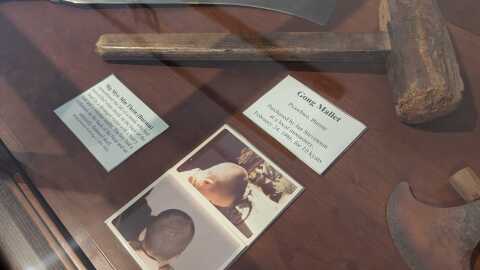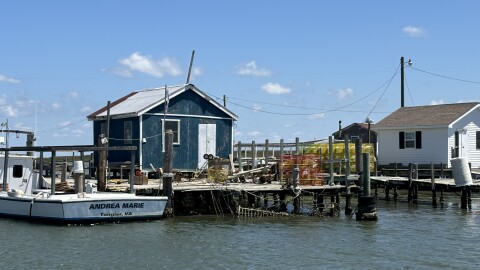Citizen science has previously spurred action by the Richmond government.
-
Groundhog Day is a “cross-quarter day” on the celestial calendar. Cross quarter days are mid-way points between the Solstices and Equinoxes. These days are associated with many familiar holidays whose astronomical roots have largely been forgotten.
-
For nearly 60 years, this office has explored the nature of consciousness.
-
Partner company hopes to have the project up and running by the 2030s.
-
A panel of experts could determine if “pattern of misconduct” occurred.
-
An ongoing review of a former state crime lab analyst’s work uncovered the error.
-
Former Science Museum of Virginia scientist captures Greek family recipes in new cookbook.
-
Early in life, the protein Reelin helps assemble the brain. Later on, it appears to protect the organ from Alzheimer's and other threats to memory and thinking.
-
Head of Harrison Family Translational Research Center discusses advances in treatment.
-
The island's lost two-thirds of its land mass since 1850 and climate change is making the problem worse.
-
Dr. Robert Winn says improved screening methods, vaccines could help wipe out the disease.
-
Join other curious minds at our first virtual Science Pub RVA to explore the topic of trust from both the personal and the societal levels. Nina Farmer, Ph.D., Assistant Professor of Psychology at Randolph-Macon College and Cary Funk, Ph.D., Director of Science and Society Research, Pew Research Center will be the featured scientific speakers.
-
There are places all over the globe that are taking on medical and economic issues through a global pandemic and many of them have varying numbers and situations unique to individual regions.
-
2020 has certainly been a tough year so far. Not only have we been dealing with a global pandemic, but now we’re hearing news about Murder Hornets! What is going on here? Murder Hornets?!? Really?!? Listen to this Question Your World radio report produced by the Science Museum of Virginia to find out.
-
Just about everything is closed and no one’s really going out, but somehow we are still having FOMO!! Why is COVID-19 giving us FOMO? Listen to Question Your World produced by the Science Museum of Virginia to learn more.
-
Miss America and VCU doctorate student, Camille Schrier, breaks stereotypes while inspiring young women to go for their passions and not be deterred by naysayers during this candid conversation and exciting science demonstration at the Science Museum of Virginia.
-
One of the biggest challenges with our global struggle with COVID-19 is knowing when and where to isolate individuals that have come into contact with someone who has tested positive for the novel coronavirus. There's a lot of talk happening about steps necessary to reopen the nation, but what are they? Due to our limited testing capabilities, how can we monitor where outbreaks are happening when so many people are involve? Can phones help track COVID19 cases?
-
We hear a lot about the importance of Science, Technology, Engineering and Math (STEM) to our global economy. We are told that STEM is where the jobs are now and where job growth will be in the future.
-
The United States recently surpassed every other country in terms of total confirmed COVID19 cases. Understanding the virus is more important than ever for our nation's ability to combat the spread. Virginia scientists are making headlines for a new approach to learning more about where Virginia cases are coming from. Can genetics help fight the spread of COVID-19?
-
Due to the global pandemic human ongoings around the globe have vastly reduced. Social distancing efforts to fight the COVID-19 outbreak also means there are fewer planes, trains, and automobiles moving around. As human activity slows down scientists are starting to see this impact our natural world. The lack of regular human activity is now noticeable in the air, on land, and in our waterways. How is COVID-19 impacting the natural world?
-
Researchers at the University of Virginia say doctors can now use genetic data to improve their abilities to treat cancer and many other diseases.
























